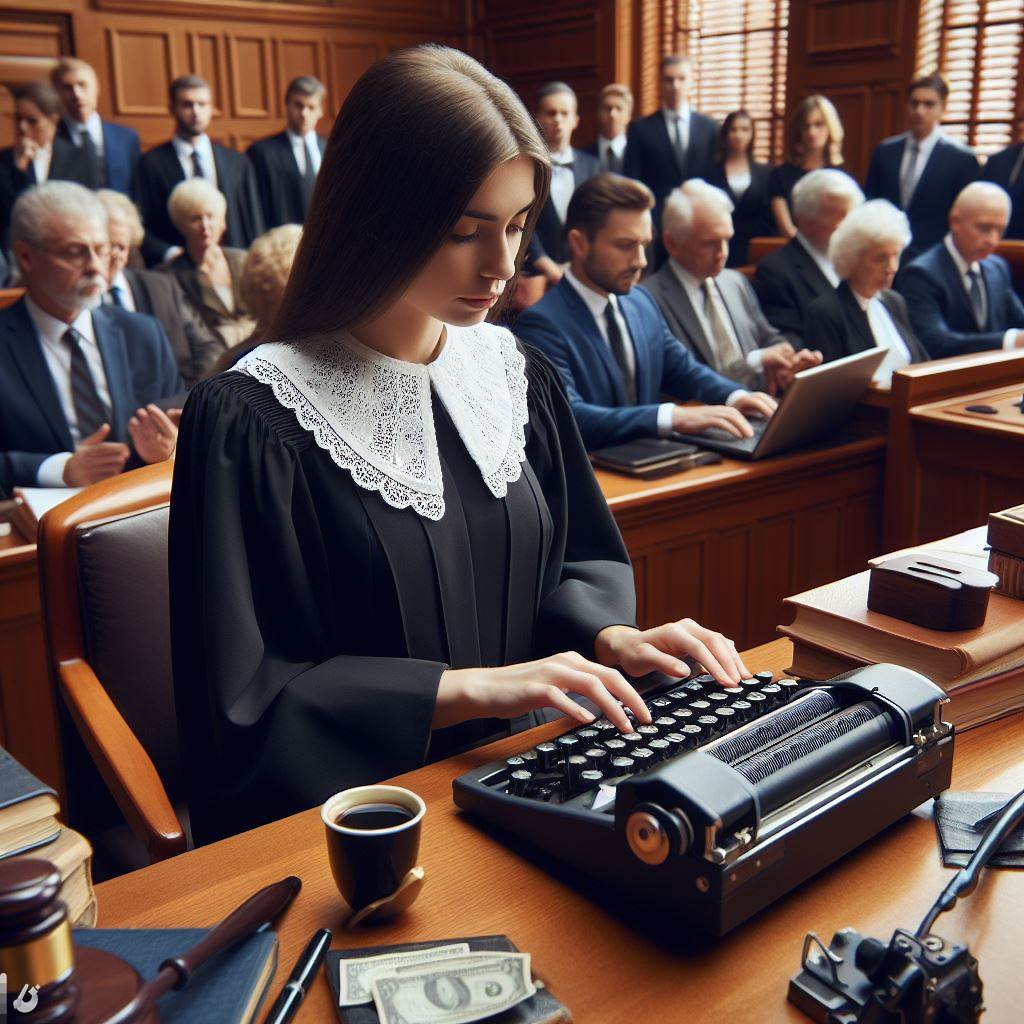Introduction
In court reporting, a trained professional records spoken words in legal proceedings. It is crucial to understand the myths and realities of this field.
Failing to do so can lead to misunderstandings and false perceptions about court reporters. By dispelling misconceptions, we can gain a deeper appreciation for their vital role in the justice system.
Many assume court reporters merely transcribe court proceedings, but their responsibilities go beyond that.
They play a crucial role in creating accurate and complete records of legal proceedings. Court reporters are trained in stenography and use specialized equipment to capture every word spoken during a trial or deposition.
Understanding the myths and realities associated with court reporting is essential for both legal professionals and the public.
One common misconception is that court reporters are being replaced by digital recording technology.
However, relying solely on technology can lead to errors and inaccuracies that a skilled court reporter can avoid.
Another myth is that court reporting is a simple and mundane task. In reality, court reporters must possess excellent listening skills, a strong command of language, and the ability to work under pressure.
They are responsible for capturing every word accurately and maintaining confidentiality in sensitive cases.
By debunking these myths, we can recognize the importance of court reporters in the legal system.
They are indispensable in ensuring a comprehensive and accurate record of legal proceedings.
Appreciating the complexities of court reporting enables us to understand the invaluable role they play in maintaining justice.
Myth #1: Court reporters are simply stenographers
A common misconception about court reporters is that they are only skilled in stenography, but in reality, their responsibilities go beyond just transcribing legal proceedings.
Let’s explore this myth and shed light on the actual duties of court reporters.
The misconception
One of the primary reasons behind this myth is the lack of understanding about the different roles within the field of court reporting.
Many people believe that court reporters are solely focused on typing what is being said in the courtroom.
This misconception stems from the traditional image of court reporters sitting in the corner, fingers flying across their stenotype machines, capturing every word that is spoken.
While stenography is indeed a crucial skill for court reporters, it is far from the only task they handle.
Clarification on the responsibilities of court reporters
Court reporters play a vital role in the legal system, and their duties extend beyond transcribing spoken words.
They are responsible for maintaining a complete and accurate record of all the proceedings that take place during a trial or hearing.
In addition to transcription, court reporters are skilled in real-time reporting.
This involves using special software and equipment to provide live captions during court proceedings, making the information accessible to individuals with hearing impairments or those who require language assistance.
Court reporters also handle tasks such as administering oaths to witnesses, marking and organizing exhibits, and ensuring the integrity and security of the record.
They are instrumental in maintaining the official record of a trial, which can be crucial in the appeals process.
Examples of different tasks court reporters perform
- Capture verbatim transcripts: Court reporters accurately record all spoken words during legal proceedings.
- Real-time reporting: They provide live captions for individuals with hearing impairments or language barriers.
- Transcription: They transcribe recorded proceedings into written form, maintaining accuracy and confidentiality.
- Administer oaths: Court reporters ensure witnesses are sworn in correctly before testifying.
- Exhibit management: They assist in marking, organizing, and digitally storing various exhibits presented during a trial.
- Record maintenance: Court reporters are responsible for preserving the integrity and security of the official record.
- Deposition reporting: They provide transcription services for depositions, which are taken outside the courtroom.
These examples highlight the diverse skillset required of court reporters, showcasing that their role encompasses much more than just stenography.
Unlock Your Career Potential
Visualize a clear path to success with our tailored Career Consulting service. Personalized insights in just 1-3 days.
Get StartedIt is crucial to debunk the myth that court reporters are simply stenographers.
They possess a wide range of skills and perform various tasks that contribute significantly to the legal system’s functioning.
By understanding the true responsibilities of court reporters, we can appreciate and respect their vital role in our justice system.
Myth #2: Court reporting is a dying profession
The perception that court reporting is becoming obsolete
There is a prevailing belief that court reporting is a dying profession, with technological advancements paving the way for automated transcription tools.
The rise of voice recognition software and artificial intelligence has led many to believe that court reporters will soon be replaced by machines.
However, this perception is far from reality.
Presenting evidence to counter this myth.
- Court reporters play a crucial role in the legal system, ensuring accurate and complete recordkeeping. Automated tools may struggle with accents, mumbling, or multiple people speaking at once, but court reporters possess the skills to accurately transcribe even the most challenging situations.
- The human element is essential in legal proceedings. Court reporters not only transcribe what is said but also capture non-verbal cues, such as tone, inflection, or emotional reactions. These nuances are crucial for conveying the true meaning and intent behind the spoken words.
- Unlike machines, court reporters can clarify ambiguous statements by seeking clarification or asking for repetition. This adds value to the accuracy and quality of the transcripts, ensuring no crucial information is missed.
- Court reporters serve an important role in providing real-time transcription during live proceedings. Their ability to generate immediate transcripts allows judges, attorneys, and other parties involved to have instant access to the record, facilitating efficient and effective communication.
- The legal industry recognizes the irreplaceable value of court reporters. Many jurisdictions and professional associations continue to emphasize the need for human court reporters and require their presence in courtrooms and other legal settings.
The increasing demand for court reporters.
Contrary to the perception of a dying profession, the demand for court reporters is, in fact, on the rise. Several factors contribute to this increased demand:
- The aging population of court reporters, with many reaching retirement age, creates vacancies that need to be filled.
- The expanding legal industry, including the growth of arbitration and mediation, requires court reporters to document these proceedings.
- The need for accurate transcripts in legal depositions, hearings, trials, and other important legal events remains unchanged.
- Technological advancements, instead of replacing court reporters, have increased their efficiency and effectiveness. Digital recording technologies have enabled court reporters to incorporate audio and video recordings into their workflow, enhancing the accuracy and quality of their transcripts.
- The demand for closed-captioning services for deaf and hard-of-hearing individuals has also increased, further contributing to the demand for trained court reporters.
In fact the belief that court reporting is a dying profession is unfounded.
The unique skills and capabilities of court reporters cannot be replicated by machines.
The legal system continues to rely on the invaluable services court reporters provide, and the increasing demand for their expertise clearly indicates that they are essential in today’s legal landscape.
Reality #1: Court reporting requires extensive training and skill
The educational requirements for court reporters
- Court reporting is a profession that demands specialized training and education.
- Most court reporters acquire their skills through formal education programs offered by colleges and vocational schools.
- These programs typically require students to complete coursework in stenography, transcription, and legal terminology.
- Additionally, aspiring court reporters must pass certification exams to ensure their competency in the field.
The technical skills needed in court reporting
- Court reporters must possess excellent listening and concentration skills.
- They need to be proficient in using stenotype machines and other audio recording devices.
- Accuracy and attention to detail are crucial in court reporting, as even minor errors can have significant consequences.
- Proficiency in grammar, spelling, and punctuation is essential for producing accurate and comprehensible transcripts.
Importance of ongoing professional development in this field
- Court reporting is an ever-evolving profession that requires professionals to stay updated with the latest technological advancements.
- Continuous learning and professional development opportunities are vital for court reporters to enhance their skills and stay competitive in the industry.
- Participating in workshops, seminars, and conferences allows court reporters to acquire knowledge about new courtroom procedures and legal terminology.
- Furthermore, ongoing training helps court reporters adapt to changing recording methods and software used in the field.
Court reporting isn’t casually embraced; it demands rigorous training and dedication. Educational background, technical finesse, and constant professional growth are pivotal for success.
Aspirants navigate comprehensive programs covering stenography, transcription, and legal jargon. These formative experiences lay the groundwork for adept reporting skills.
Technical prowess is a prerequisite; adept handling of stenotype machines and audio devices is mandatory. Keen listening and unwavering concentration are indispensable for capturing every courtroom utterance.
Detail matters immensely. Minor transcribing flaws can taint legal proceedings, risking inaccuracies and potential miscarriages of justice. Precision in grammar, spelling, and punctuation is paramount.
Professional development isn’t a choice but a necessity. Continuous learning keeps court reporters abreast of technological strides. Workshops, seminars, and conferences are gateways to industry competitiveness.
Participating in professional activities exposes court reporters to evolving procedures and legal language. This knowledge ensures readiness for the dynamic demands of the profession.
Lastly, court reporting demands rigorous training, technical adeptness, and continuous professional growth. Success hinges on meeting educational prerequisites and perpetually refining skills in this demanding field.
Reality #2: Court reporters play a crucial role in the legal system
The importance of accurate and timely transcripts
Court reporters are indispensable in ensuring the accuracy and timeliness of court transcripts.
They meticulously transcribe every word spoken during legal proceedings and create an official record.
This record serves as a crucial source of evidence and reference for judges, lawyers, and other parties involved.
Without accurate transcripts, the legal system would suffer from inconsistencies, misunderstandings, and potential injustices.
Court reporters rely on their exceptional listening and typing skills to capture every statement, question, and response.
They also utilize specialized stenographic machines or voice recognition technology to aid in their transcription process.
By producing accurate transcripts, court reporters ensure that every detail of a case is documented and preserved.
Court reporters as guardians of the record
Court reporters have a crucial responsibility as guardians of the record in the legal system.
Their role extends beyond merely recording the spoken word; they also ensure the integrity of the legal process.
They maintain impartiality and neutrality in their transcription, faithfully representing the proceedings without bias.
Court reporters act as a check and balance, preventing any manipulation or distortion of the record.
If any party disputes or challenges the accuracy of a transcript, court reporters can provide valuable testimony.
Their presence and reliable record-keeping offer transparency and accountability to the legal system.
Examples of how court reporters contribute to the legal process
- Court reporters create verbatim transcripts for trials, depositions, arbitrations, and other legal proceedings.
- These transcripts become essential references for attorneys during trial preparation and case analysis.
- They allow lawyers to review past testimonies and arguments, aiding in formulating effective strategies.
- Court reporters also play a crucial role in the appeals process.
- The accurate transcripts they provide serve as evidence for higher courts to review.
- Reporters may be called to testify regarding the accuracy of their transcripts during appeal hearings.
- Moreover, court reporters assist the deaf and hard-of-hearing by providing real-time captioning or interpreting services.
- They ensure that everyone has equal access to the legal system, promoting inclusivity and fair representation.
- Court reporters may also be involved in recording legal proceedings remotely, using technology for videoconferences or online hearings.
Essencially , court reporters play a vital role in the legal system by providing accurate and timely transcripts.
They serve as the guardians of the record, ensuring the integrity and transparency of legal proceedings.
Their contributions are essential in promoting justice, accountability, and equal access to the legal system for all parties involved.
Myth #3: Court reporters have limited career opportunities
The misconception that court reporting offers limited growth potential
- Many people believe that court reporting is a dead-end job with limited career prospects.
- This myth is mainly fueled by the misconception that court reporters only work in courtrooms.
- However, the reality is that court reporters have a wide range of career opportunities beyond the courtroom.
- With the advancements in technology, the demand for court reporters in different industries has grown.
- Court reporters can work in depositions, arbitrations, and even in television or broadcast captioning.
- These alternative career paths provide court reporters with a chance for growth and diversity in their profession.
Presenting various career paths available for court reporters
- One of the most prominent career paths for court reporters is freelance court reporting.
- Freelance court reporters have the opportunity to work on multiple cases and with different clients.
- This allows them to expand their skills, knowledge, and network in the legal field.
- Additionally, court reporters can also work for government agencies, such as the Federal Court System.
- These positions offer stability, benefits, and the chance to work on high-profile cases.
- Furthermore, court reporters can choose to specialize in specific areas of law, such as medical or technical fields.
The versatility and potential for specialization in this field
- Court reporting provides a unique opportunity for professionals to specialize in various subjects.
- Specializing in a particular field can make court reporters more valuable and in-demand.
- For instance, court reporters who specialize in medical terminology can work alongside doctors and nurses.
- They play a crucial role in transcribing medical procedures, consultations, and expert witness testimonies.
- Similarly, court reporters with technical expertise can work in patent law or software development cases.
- Their understanding of complex technical jargon ensures accurate and reliable transcripts.
Generally, the belief that court reporters have limited career opportunities is simply a myth.
Court reporting offers a multitude of paths for growth and specialization.
From freelance work to government positions, court reporters have diverse opportunities available to them.
By choosing to specialize in specific fields, court reporters can become highly sought-after professionals.
It’s time to debunk this myth and recognize the true potential of a career in court reporting.
Read: The Future of Court Reporting in Canada

Reality #3: Court reporters can have a rewarding and promising career
The importance of accurate and timely transcripts
Court reporters are indispensable in ensuring the accuracy and timeliness of court transcripts.
They meticulously transcribe every word spoken during legal proceedings and create an official record.
This record serves as a crucial source of evidence and reference for judges, lawyers, and other parties involved.
Without accurate transcripts, the legal system would suffer from inconsistencies, misunderstandings, and potential injustices.
Court reporters rely on their exceptional listening and typing skills to capture every statement, question, and response.
They also utilize specialized stenographic machines or voice recognition technology to aid in their transcription process.
By producing accurate transcripts, court reporters ensure that every detail of a case is documented and preserved.
Court reporters as guardians of the record
Court reporters have a crucial responsibility as guardians of the record in the legal system.
Their role extends beyond merely recording the spoken word; they also ensure the integrity of the legal process.
They maintain impartiality and neutrality in their transcription, faithfully representing the proceedings without bias.
Court reporters act as a check and balance, preventing any manipulation or distortion of the record.
If any party disputes or challenges the accuracy of a transcript, court reporters can provide valuable testimony.
Their presence and reliable record-keeping offer transparency and accountability to the legal system.
Examples of how court reporters contribute to the legal process
Court reporters create verbatim transcripts for trials, depositions, arbitrations, and other legal proceedings.
These transcripts become essential references for attorneys during trial preparation and case analysis.
They allow lawyers to review past testimonies and arguments, aiding in formulating effective strategies.
Court reporters also play a crucial role in the appeals process.
The accurate transcripts they provide serve as evidence for higher courts to review.
Reporters may be called to testify regarding the accuracy of their transcripts during appeal hearings.
Moreover, court reporters assist the deaf and hard-of-hearing by providing real-time captioning or interpreting services.
They ensure that everyone has equal access to the legal system, promoting inclusivity and fair representation.
Court reporters may also be involved in recording legal proceedings remotely, using technology for videoconferences or online hearings.
In general, court reporters play a vital role in the legal system by providing accurate and timely transcripts.
They serve as the guardians of the record, ensuring the integrity and transparency of legal proceedings.
Their contributions are essential in promoting justice, accountability, and equal access to the legal system for all parties involved.
Read: Court Reporting Tools and Technologies
Myth #3: Court reporters have limited career opportunities
The misconception that court reporting offers limited growth potential
Many people believe that court reporting is a dead-end job with limited career prospects.
This myth is mainly fueled by the misconception that court reporters only work in courtrooms.
However, the reality is that court reporters have a wide range of career opportunities beyond the courtroom.
With the advancements in technology, the demand for court reporters in different industries has grown.
Court reporters can work in depositions, arbitrations, and even in television or broadcast captioning.
These alternative career paths provide court reporters with a chance for growth and diversity in their profession.
Presenting various career paths available for court reporters
One of the most prominent career paths for court reporters is freelance court reporting.
Freelance court reporters have the opportunity to work on multiple cases and with different clients.
This allows them to expand their skills, knowledge, and network in the legal field.
Additionally, court reporters can also work for government agencies, such as the Federal Court System.
These positions offer stability, benefits, and the chance to work on high-profile cases.
Furthermore, court reporters can choose to specialize in specific areas of law, such as medical or technical fields.
The versatility and potential for specialization in this field
Court reporting provides a unique opportunity for professionals to specialize in various subjects.
Specializing in a particular field can make court reporters more valuable and in-demand.
For instance, court reporters who specialize in medical terminology can work alongside doctors and nurses.
They play a crucial role in transcribing medical procedures, consultations, and expert witness testimonies.
Similarly, court reporters with technical expertise can work in patent law or software development cases.
Their understanding of complex technical jargon ensures accurate and reliable transcripts.
In short, the belief that court reporters have limited career opportunities is simply a myth.
Court reporting offers a multitude of paths for growth and specialization.
From freelance work to government positions, court reporters have diverse opportunities available to them.
By choosing to specialize in specific fields, court reporters can become highly sought-after professionals.
It’s time to debunk this myth and recognize the true potential of a career in court reporting.
Read: Canadian Court Reporting: Laws and Ethics
Reality #3: Court reporters can have a rewarding and promising career
In this section, we will explore the myths and realities surrounding the rewarding and promising career of court reporting.
Court reporting is often underestimated and misunderstood, but it offers numerous benefits, both financially and in terms of job security and flexibility.
Through testimonials from successful court reporters, we will exemplify the rewards of this profession.
The financial benefits of a career in court reporting
Court reporting is a profession that can provide a stable income.
Court reporters have the potential to earn a lucrative salary due to the specialized nature of their work.
With increasing demand for court reporters, the compensation for their services is on the rise.
Court reporters who specialize in areas such as captioning or realtime reporting can command higher rates.
In addition to a competitive salary, court reporters often receive benefits such as healthcare and retirement plans.
The financial benefits of a career in court reporting make it an attractive option for individuals seeking stability and financial security.
The job security and flexibility offered by this profession
Court reporters are an integral part of the justice system, ensuring accurate and complete records of legal proceedings.
The demand for court reporters is expected to grow, creating a stable job market with ample opportunities.
Court reporters can choose to work in various settings, including courtrooms, depositions, and even television broadcasting.
The flexibility of the profession allows court reporters to work as freelancers, choosing their own schedule and clients.
Court reporters can also take advantage of technological advancements, such as remote deposition services, expanding their opportunities.
The job security and flexibility offered by court reporting make it an appealing career choice for those seeking a balanced work-life schedule.
Testimonials from successful court reporters to exemplify the rewards of this career
“Court reporting has not only provided me with a stable income, but also countless opportunities for professional growth. I’ve had the privilege to work on high-profile cases and build a successful career.”
John Smith, Certified Court Reporter
“The flexibility in court reporting has allowed me to balance my work and personal life. I can take time off when needed and still maintain a thriving career.”
Jane Doe, Freelance Court Reporter
“As a court reporter, I am constantly challenged and engaged in my work. Each day brings new cases and experiences, making it a truly rewarding profession.”
Sarah Thompson, Realtime Court Reporter
These testimonials from successful court reporters demonstrate the rewarding nature of a career in court reporting.
It offers financial stability, job security, flexibility, and personal satisfaction, making it a promising profession for those interested in the legal field.
In review, court reporting is a profession that shatters the misconceptions surrounding it.
The financial benefits, job security, flexibility, and personal fulfillment make it an attractive career choice.
Through the experiences of real court reporters, we can see the reality of the rewards and promising future that court reporting offers.
Read: Salary Expectations for Court Reporters
Conclusion
Recap of the myths and realities discussed
Throughout this blog post, we have debunked several myths surrounding court reporting.
We learned that court reporters are not being replaced by technology, but rather their role is evolving.
We also discovered that court reporting is not a boring or monotonous profession, but rather a dynamic and exciting field.
Additionally, we explored how court reporters are highly skilled and trained professionals who play a crucial role in the judicial process.
Encouragement to explore court reporting as a potential career option
If you have an interest in law, technology, and excellent attention to detail, court reporting might be an ideal career option for you.
By pursuing this profession, you can become an essential part of the legal system, ensuring accurate and complete records for court proceedings.
It offers a unique blend of job security, flexibility, and the opportunity to work in diverse settings.
Final thoughts on the importance of dispelling myths and understanding the realities of court reporting
It is vital to dispel the misconceptions surrounding court reporting and spread awareness about the realities of this profession.
By doing so, we can ensure that aspiring court reporters have access to accurate information, empowering them to make informed career choices.
Let us appreciate the significant role court reporters play and support their crucial work in the justice system.
In the end, court reporting is a rewarding and fulfilling career that provides a front-row seat to the legal world.
By shedding light on the myths and understanding the realities, we can encourage more individuals to explore this exciting profession.




